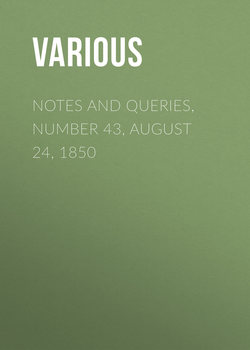Читать книгу Notes and Queries, Number 43, August 24, 1850 - Various - Страница 3
NOTES
TENYSON.—COLERIDGE.—EXTRACT FROM BAKER'S MSS. ON BARTH. DODYNGTON, AND WILLIAM JENKYN
ОглавлениеThe well-known lines in Tenyson's Locksley Hall,—
"This is truth the poet sings,
That a sorrow's crown of sorrow is, remembering happier things."
appear to be taken from Dante (Inferno, canto v. Verse 121.),—
"nessun maggior dolore,
Che ricordarsi del tempo felice
Nella miseria."
which is imitated by other writers, quoted by Mr. Cary. (Chaucer, Troilus and Creseide, iii. 1626. Marino, Adone, c. xiv., st. 100. Fortinguerra, Riciardetto, c. xi. st. 83.)
In Coleridge's second Lay Sermon (ed. 1839, p. 365.) the passage—
"What are you," (a philosopher was once asked), "in consequence of your admiration of these abstruse speculations?" He answered; "What I am, it does not become me to say; but what thousands are, who despise them, and even pride themselves on their ignorance, I see, and tremble."
is a quotation from Schiller (Werke, vol. i., p. 414. 1838)
"AN DIE MUSE.
"Was ich ohne dich wäre, ich weiss es nicht; aber mir
grauet,
Seh'ich, was ohne dich Hundert und Tausende sind."
In Appendix (B.) to Coleridge's first Lay Sermon (p. 276.), we read,—
"An age or nation may become free from certain prejudices, beliefs, and superstitious practices, in two ways. It may have really risen above them; or it may have fallen below them, and become too bad for their continuance."
Though not given as a quotation, this passage is no doubt borrowed from Baader, as quoted by Archdeacon Hare in a note to his Sermons on the Mission of the Comforter,—
"Nations, like individuals, may get free and rid of certain prejudices, beliefs, customs, abuses, &c., in two ways. They may really have risen above them, or they may have fallen below them and become too bad for them."
In a volume of tracts (Class mark Gg. 5. 27.) in St. John's College Library, Cambridge, is a copy of Nicolas Carr's edition of the Olynthiacs and Philippics of Demosthenes, (4to. London, Henry Denham 1571.). As Carr died before the work was published, his friends wrote a number of commemorative pieces in Greek and Latin, prose and verse, which are annexed to the volume. Amongst the rest, Barth. Dodyngton wrote a copy of Greek elegiacs, and a Latin prose epistle. On Dodyngton, Baker has written the following note:—
"Barthol. Dodyngtonus in Com. Middlesex. natus, admissus fuit Discipulus Coll. Jo. pro Fundatrice an. 1548.—Idem admissus Socius, Apr. 8, an. 1552.—Idem admissus Socius Senior, an. 1558.—Idem admissus Socius Major Coll. Trin. Oct. 29, an. 1580."
In the same volume is note on Cheke:—
"Joan. Cheke admissus Socius Coll. Jo. Cant., Mar. 26, an. 21. Henrici 8'vi."
Another tract in the same volume is "Exodus, &c., a Sermon Preach't Sept. 12, 1675. By occasion of the much lamented Death of that Learned and Reverend Minister of Christ, Dr. Lazarus Seaman."—By William Jenkyn. After Dr. Seaman's name Baker adds, "some time Master of Peter House." Of Jenkyn he says: "Gul. Jenkin Coll. Jo. admissus in Matriculam Academiæ (designatus Joannensis), Jul. 3, an. 1628."
J.E.B. Mayor.
St. John's College, Cambridge.
